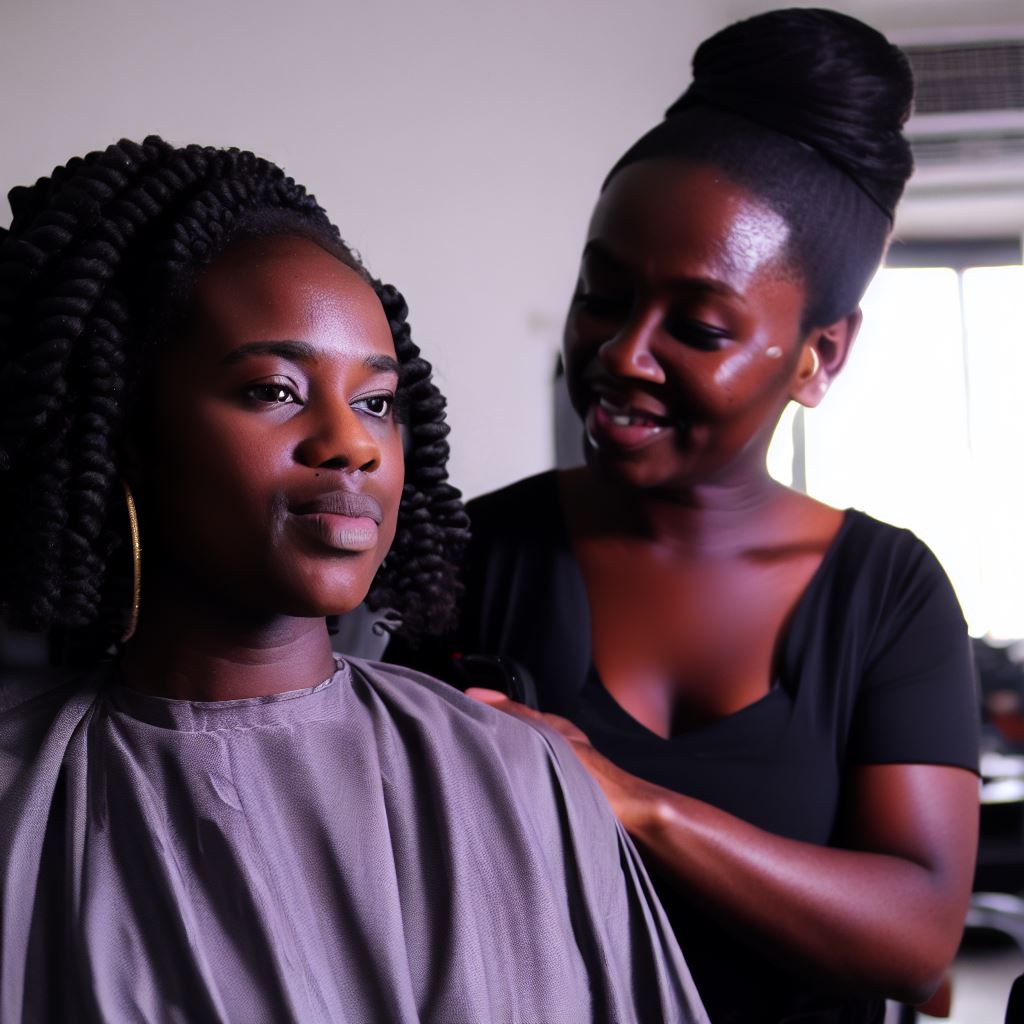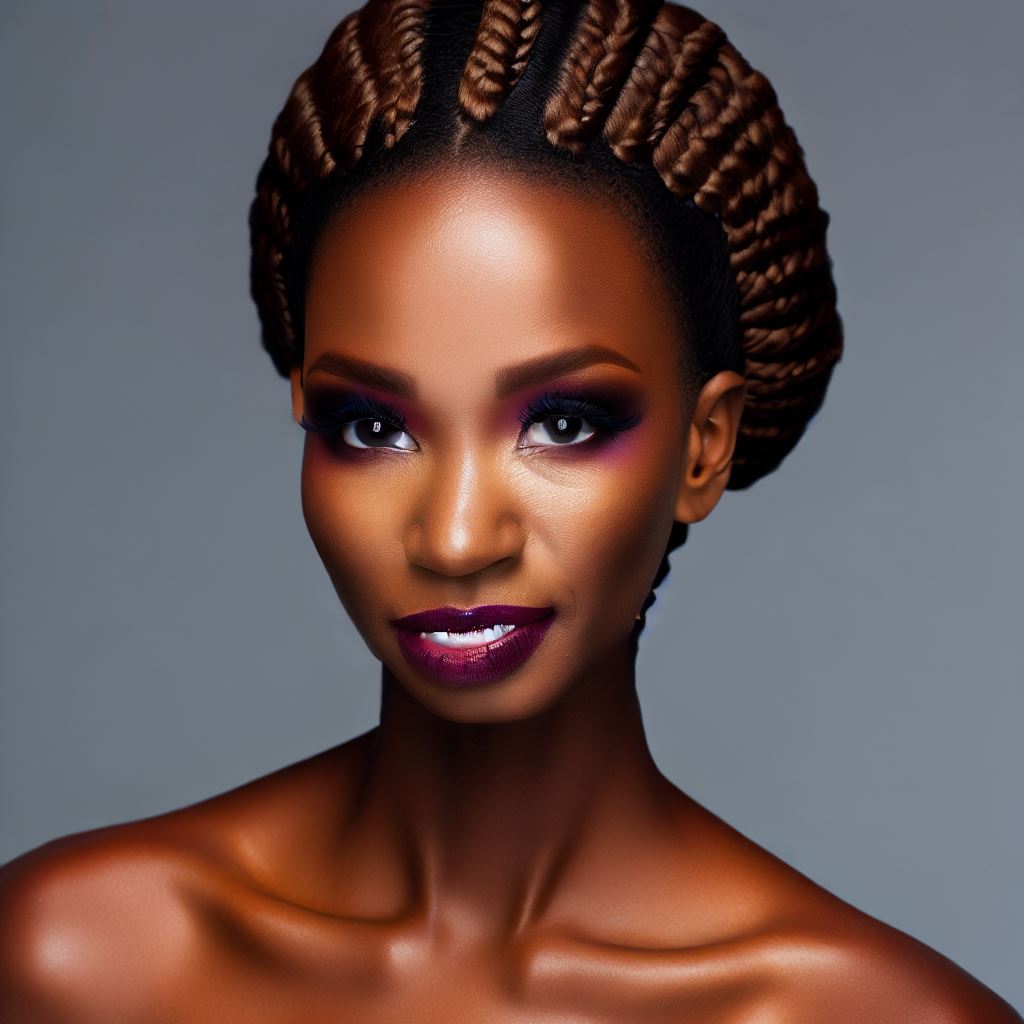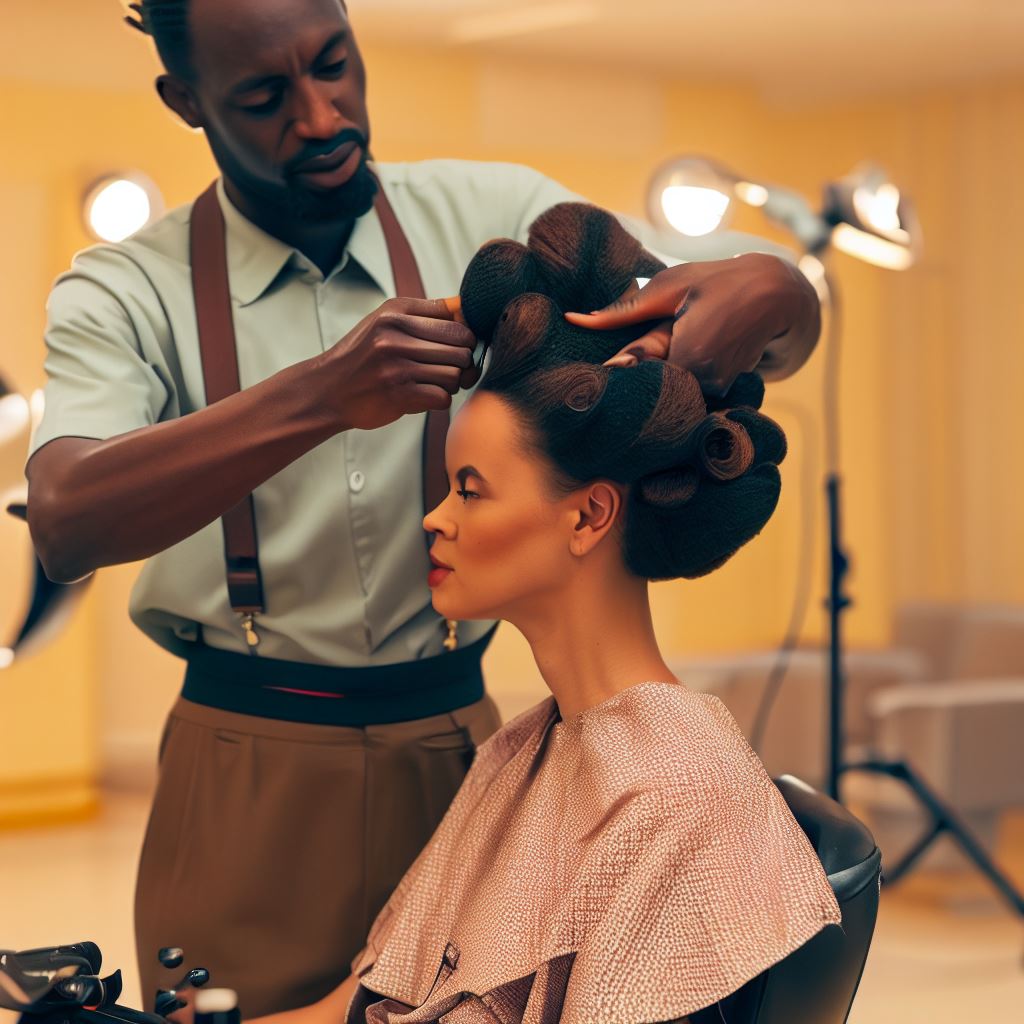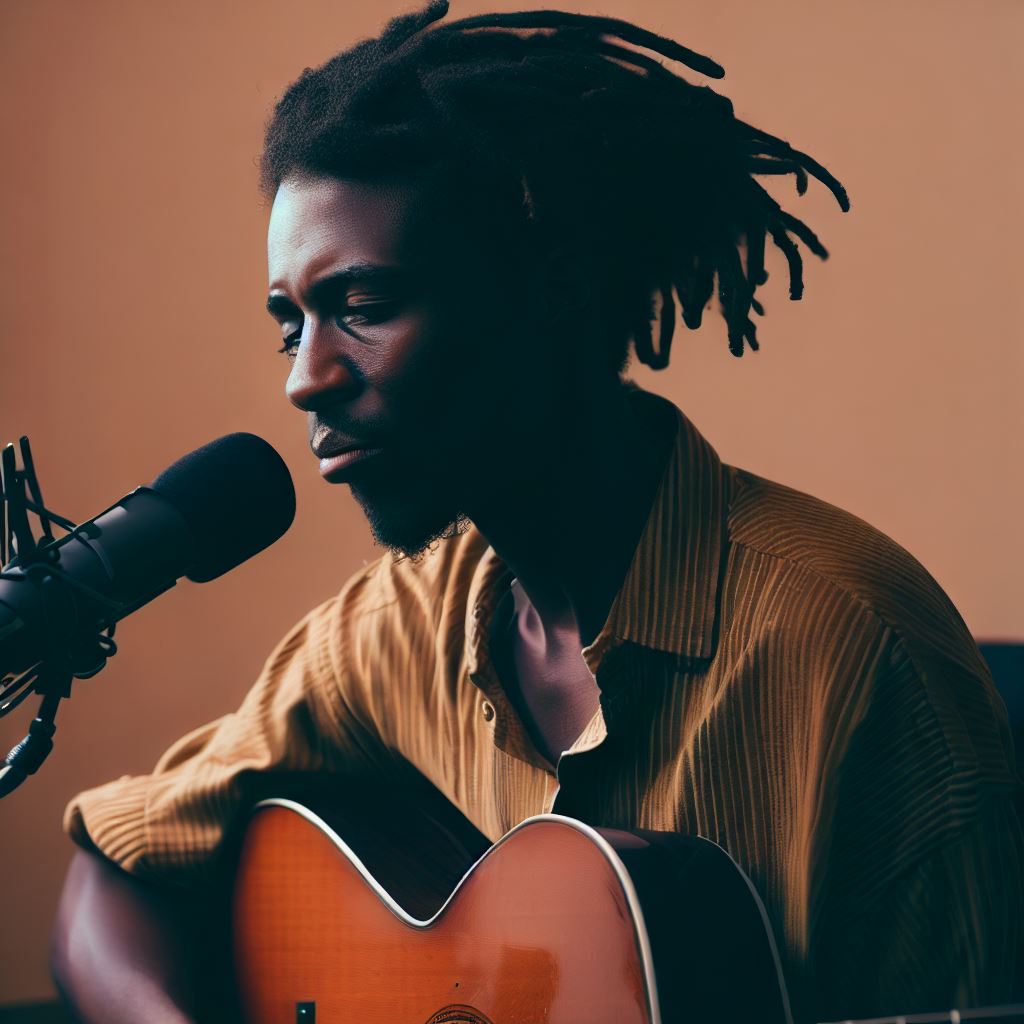Introduction
Film hair stylists in Nigerian cinema play a crucial role in creating authentic and captivating characters.
Hair styling is essential in films as it enhances character development, historical accuracy, and visual storytelling.
In the sprawling landscape of the Nigerian film industry, often hailed as Nollywood, there exists a group of unsung heroes whose creative prowess remains hidden in plain sight.
These are the Film Hair Stylists, the uncelebrated artisans who play a pivotal role in shaping the visual narrative of Nigerian cinema.
Film hair stylists deserve recognition as unsung heroes in Nigerian cinema as their artistry brings characters and stories to life.
As the industry continues to surge forward, captivating global audiences with its unique storytelling and cultural resonance, the meticulous craftsmanship of these stylists is coming to the forefront, breathing life into characters and settings with their deft touch.
This exploration embarks on a journey through the bustling sets, weaving together stories and artistic expressions, to shed light on the indispensable contribution of these silent yet indispensable artisans in the tapestry of Nigerian cinema.
Through their nimble fingers and artistic vision, they not only create iconic looks but also provide an authentic reflection of culture and societal nuances.
This in-depth study seeks to unravel the intricate artistry, the challenges faced, and the transformative influence of Film Hair Stylists, inviting readers to appreciate the unsung heroes who shape the visual identity of Nigerian cinema.
Role and Responsibilities of Film Hair Stylists
The primary role of film hair stylists in Nigerian cinema
Film hair stylists in Nigerian cinema are the unsung heroes behind the captivating hairstyles seen on the big screen.
Their primary role is to create and maintain hairstyles that bring characters to life.
Through their expertise and artistry, they contribute to the visual appeal and storytelling elements of a movie.
Their responsibilities in creating and maintaining hairstyles for actors
When it comes to creating hairstyles for actors, film hair stylists assume various responsibilities.
They conduct thorough research, considering factors such as the character’s personality, background, and the film’s storyline.
By collaborating with the director, costume designer, and makeup artist, they ensure that the hairstyle harmonizes with other visual elements, creating a cohesive look for the character.
In addition to designing hairstyles, film hair stylists also take charge of the proper care and styling of wigs and extensions used in the film.
They handle the wig selection process, ensuring that they withstand the demands of filming and achieve the desired aesthetic.
Throughout the filming process, they remain present on set, making any necessary touch-ups or adjustments to maintain the desired hairstyle’s continuity.
Importance of hair styling in character development
While hair styling may seem like a minor aspect of character development, it plays a significant role in creating a believable and immersive cinematic experience.
Hairstyles can convey essential information about a character, such as their time period, social status, and even their personality.
Well-executed hairstyles help actors fully embody their characters and enable the audience to connect with them on a deeper level.
Moreover, changes in hairstyles can serve as powerful visual cues for character development.
A sudden transformation in hairstyle can signify personal growth, a shift in circumstances, or even plot twists.
Through strategic hair styling choices, film hair stylists contribute to the overall narrative arc.
Lastly, the attention to detail in hair styling showcases the professionalism and dedication of film hair stylists.
Their craft often goes unnoticed, but the impact of their work is felt by the audience.
Whether it’s recreating historical hairstyles or creating imaginative looks for fantasy films, their contribution adds a layer of authenticity and visual richness to the storytelling process.
In fact, film hair stylists in Nigerian cinema are instrumental in shaping the iconic looks of characters.
Their primary role involves creating and maintaining hairstyles that align with the character’s personality and the film’s storyline.
With their attention to detail and creative flair, they help immerse the audience in the world of the movie, making them the unsung heroes of Nigerian cinema.
Read: The Art of Hair Styling in Nigeria’s Vibrant Film Industry
Historical Significance of Hair Styling in Nigerian Cinema
Brief Overview of the Evolution of Nigerian Cinema
With its origins dating back to the 1920s, Nigerian cinema has experienced significant growth and transformation over the years.
From the days of silent films to the emergence of Nollywood, it has become the second-largest film industry in the world.
Hairstyles as Portrayals of Cultural Identities in Films
Hairstyles have always played a crucial role in Nigerian cinema, serving as powerful tools to portray cultural identities.
They have been used to showcase the diversity and rich heritage of Nigeria’s various ethnic groups.
Iconic Hairstyles Synonymous with Nigerian Cinema
1. The Afro
The 1970s marked the era of the Afro hairstyle in Nigerian cinema. It became a symbol of African pride and identity, representing a break from Western standards of beauty.
2. Gele
Gele, a traditional Nigerian head wrap, has become an iconic hairstyle in Nigerian films.
It signifies elegance and is often worn by female characters at important occasions such as weddings or cultural ceremonies.
3. Dreadlocks
Dreadlocks have been a recurring trend in Nigerian cinema, representing rebellion, freedom, and individuality.
They have been portrayed by both male and female characters in various films.
4. Oya Becca’s Unique Hairline
Oya Becca, a character from the classic Nigerian film “Igodo,” had a distinctive hairstyle with hairlines forming a zigzag pattern.
This unique hairstyle became widely recognized and associated with the character.
5. Bantu Knots
Bantu knots, also known as Zulu knots, have gained popularity in Nigerian cinema.
They are often styled in intricate patterns, reflecting the beauty of African hairstyles.
6. Shuku
Shuku, a braided hairstyle where the hair is gathered into a bun or ponytail at the top of the head, has been a staple in Nigerian cinema for decades.
It is often seen on female characters to showcase elegance and sophistication.
7. Emeka Ike’s Caesar Cut
The Caesar cut, popularized by Nigerian actor Emeka Ike, became a trendsetter in Nigerian cinema.
This short, straight fringe hairstyle exuded confidence and sophistication.
8. Fulani Braids
Fulani braids, inspired by the Fulani ethnic group, have become an iconic hairstyle in Nigerian films.
The braids are typically adorned with beads and cowrie shells, representing African heritage and beauty.
9. Ijeoma Okorie’s “Eko for Show” Style
Ijeoma Okorie’s character in the film “Eko for Show” sported a unique hairstyle with bright colors and quirky designs.
This iconic hairstyle became synonymous with the film and garnered attention from audiences.
10. Irikefe’s Unique Red Hair
Irikefe, a character portrayed by Nigerian actress Dakore Egbuson, showcased a striking red hairstyle in the film “Isoken.”
This hair color choice symbolized the character’s boldness and non-conformity.
In short, hair stylists in Nigerian cinema have played a significant role in portraying cultural identities.
Hairstyles in Nigerian films have evolved over time and have become iconic representations of Nigerian culture and fashion, reflecting the diversity and richness of the country’s heritage.
Read: Case Study: The Evolution of Hair Styling in Nollywood
Challenges Faced by Film Hair Stylists in Nigerian Cinema
Limited Resources and Budget Constraints
Film hair stylists in Nigerian cinema often face challenges due to limited resources and budget constraints.
They have to work with minimal funding, making it difficult to acquire high-quality hair products.
Inadequate resources result in limitations when it comes to creating unique and authentic hairstyles.
These stylists often have to rely on their ingenuity and resourcefulness to achieve desired looks within budget constraints.
Despite the challenges, they strive to bring out the characters’ essence through their hairstyles.
Necessity for Improvisation and Creativity
Film hair stylists in Nigerian cinema face limited access to specialized hair products and tools.
Due to this limitation, they must think outside the box and find creative ways to achieve desired hairdos.
Some hairstylists may use ordinary household items or inexpensive alternatives to create stunning hairstyles.
They have to constantly innovate and come up with new techniques to enhance the visual appeal of the characters.
Despite the challenges, their improvisation and creativity often result in remarkable and eye-catching hairstyles on screen.
Importance of Versatility in Hairstyling
Film hair stylists in Nigerian cinema must possess versatile skills to meet the demands of different film genres.
Each genre requires distinct hairstyles that reflect the characters’ personalities and the movie’s overall theme.
They need to be adept at creating period-specific hairstyles for historical films and contemporary styles for modern dramas.
They must also stay updated with current fashion trends and popular hairstyles to make the characters look authentic and relatable.
Their versatility allows them to adapt and transform characters through their hairstyles, adding depth to the storytelling process.
In general, film hair stylists in Nigerian cinema face various challenges that require them to be resourceful, creative, and versatile.
Limited resources and budget constraints necessitate improvisation, while a lack of access to specialized products demands creativity.
Additionally, versatility is crucial to meet the diverse demands of different film genres.
Despite these challenges, hair stylists in Nigerian cinema continue to play an essential role in bringing characters to life through their exceptional hairstyling skills.
Read: Celebrity Hair: Spotlight on Nigerian Film Hair Stylists
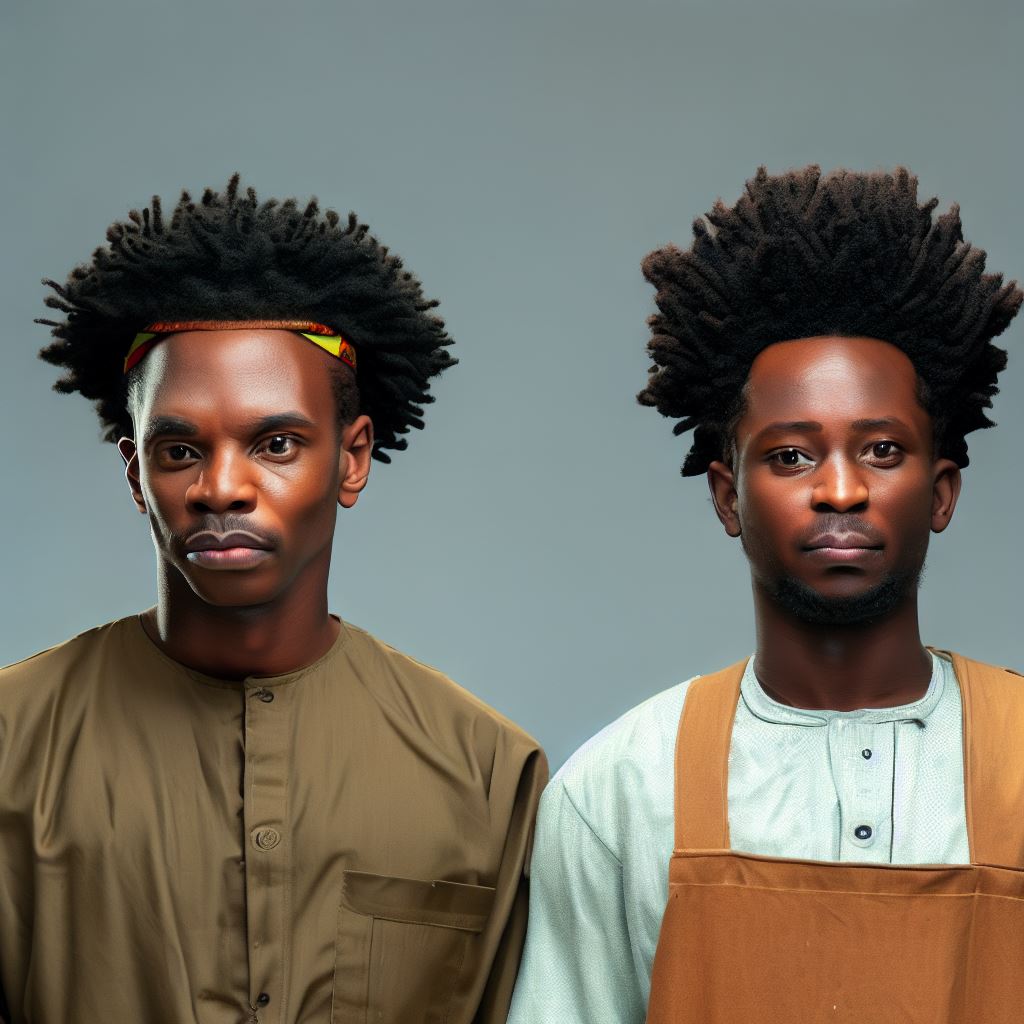
Collaboration with Other Film Departments
The Collaborative Nature of the Filmmaking Process
Collaboration is the cornerstone of the filmmaking process, as it involves a collective effort to bring a vision to life.
In the context of hairstyling, it is crucial for hair stylists to work closely with other film departments.
By joining forces, each department enhances their contributions, leading to a seamless final product.
The Importance of Working Closely with the Costume Department and Makeup Artists
Hair stylists must establish a strong relationship with the costume department and makeup artists.
Together, they create harmonious looks that complement the characters and bring the story to life.
Collaboration allows them to ensure that the visual elements work in tandem, enhancing the overall impact of the film.
Examples of Achieving the Overall Visual Aesthetic through Collaboration
1. Period Dramas
In a period film, collaboration allows hair stylists, costume designers, and makeup artists to recreate historical eras authentically.
Through thoughtful coordination, they achieve a cohesive visual aesthetic, transporting the audience to a different time.
2. Fantasy Films
In the realm of fantasy, collaboration plays a vital role in creating imaginative characters.
Hair stylists work closely with costume designers and makeup artists to develop unique looks that complement the fantastical setting.
Publish Your Professional Profile, Business or Brand
Showcase your expertise, gain trust, and boost visibility instantly on Professions.ng.
Publish Now3. Contemporary Films
Even in contemporary cinema, collaboration among departments is essential to maintain consistency.
Hair stylists, costume designers, and makeup artists collaborate to ensure the characters look realistic and cohesive within the film’s world.
4. Action Films
Action films often require intense physical sequences where hair can become disheveled.
In collaboration with makeup artists and costume designers, hair stylists make adjustments to maintain continuity throughout high-energy scenes.
5. Period-specific Hairdos
Collaboration between all departments is crucial in achieving accurate period-specific hairdos.
Through research and collaboration, hairstylists ensure that the hairstyles reflect the time period and align with the overall visual aesthetic.
6. Character Development
Collaboration between hair stylists, costume designers, and makeup artists aids in character development.
Changes in a character’s appearance can signify growth, emotional transformations, or transitions in the film’s narrative.
Overall, collaboration among film departments is crucial in achieving a cohesive and visually captivating film.
Hair stylists working closely with the costume department and makeup artists ensure that the characters and the story are portrayed effectively.
By pooling their expertise, talents, and creativity, these unsung heroes contribute significantly to the overall success of Nigerian cinema.
Read: Innovative Hair Techniques in Nigeria’s Film Industry
Unsung Heroes: Recognition and Appreciation
Lack of Recognition and Appreciation for Film Hair Stylists in Nigerian Cinema
- Film hair stylists often go unnoticed and unappreciated in the Nigerian cinema industry.
- Their crucial role in transforming actors into characters is often overlooked.
- Despite their significant contributions, film hair stylists are rarely acknowledged on screen or in awards.
- The lack of recognition can be demoralizing for the hair stylists who put in immense effort.
- This issue stems from the perception that hair styling is a minor aspect of filmmaking.
Importance of Acknowledging the Contributions of Film Hair Stylists
- Film hair stylists play a vital role in creating the overall look and feel of a film.
- They work closely with the director and costume department to ensure coherence and authenticity.
- Hair styling helps in establishing the time period, geographical location, and character traits.
- The attention to detail by hair stylists adds depth and richness to the storytelling process.
- They possess the skill to successfully depict various hairstyles that mirror different cultures or historical eras.
Encouraging the Audience to Appreciate the Artistry and Hard Work of Film Hair Stylists
- The audience must recognize the artistry and creativity behind the hairstyles seen on screen.
- Understanding the efforts of film hair stylists can enhance the viewing experience.
- Appreciating the dedication of these professionals will encourage them to continue delivering exceptional work.
- Sharing behind-the-scenes stories and highlighting the importance of hair styling can raise awareness.
- Supporting initiatives that honor and celebrate the work of film hair stylists can make a difference.
- By showing appreciation, film enthusiasts contribute to the growth and development of the Nigerian cinema industry.
In review, the lack of recognition and appreciation for film hair stylists in Nigerian cinema is a significant issue that needs attention.
These unsung heroes contribute immensely to the success and authenticity of films.
It is important for the audience to acknowledge their artistry and hard work, and for the industry to give them the recognition they deserve.
By taking steps to appreciate film hair stylists, we can boost their morale and foster a more vibrant and creative Nigerian cinema industry.
Success Stories: Celebrating the Work of Film Hair Stylists
As we continue our exploration of the behind-the-scenes heroes of Nigerian cinema, it’s time to shine the spotlight on the talented film hair stylists.
These unsung heroes play a vital role in bringing characters to life and creating unforgettable looks.
Let’s delve into the success stories of notable Nigerian film hair stylists, highlighting their achievements and the impact of their work on Nigerian cinema.
Success stories of notable Nigerian film hair stylists
- Dora Akunyili: With over two decades of experience, Akunyili has transformed the hairstyles of numerous actors and actresses, earning her a reputation as one of the best in the industry.
- Emeka Nwahiri: This talented hair stylist has worked on several award-winning films, including “The Figurine” and “Half of a Yellow Sun,” receiving praise for his attention to detail and creativity.
- Stella Adebayo: Adebayo’s exceptional skills have made her a sought-after hair stylist in Nollywood. She has worked on both small-budget films and high-profile productions, showcasing her versatility.
Their achievements and the impact of their work on Nigerian cinema
The achievements of these film hair stylists have left an indelible mark on Nigerian cinema.
Through their meticulous work, they have contributed to the authenticity and visual appeal of countless films.
Their expertise in creating hairstyles that reflect different time periods, social classes, and cultural backgrounds has elevated the storytelling experience for audiences.
Not only do these hair stylists enhance the overall aesthetic of Nigerian films, but they also play a crucial role in character development.
The hairstyles they create become an extension of the characters’ personalities, providing valuable insights into their backgrounds and helping the audience connect with them on a deeper level.
Moreover, the impact of these stylists goes beyond the silver screen.
They inspire aspiring hair stylists to pursue their passion and showcase their talent in the world of cinema.
Many emerging hair stylists look up to these successful individuals as role models, hoping to make their mark in the industry by following in their footsteps.
Inspiration for aspiring film hair stylists to pursue their passion and showcase their talent
For those dreaming of a career in film hair styling, the success stories of these notable Nigerian stylists serve as a reminder that with determination and hard work, anything is possible.
Their journeys from humble beginnings to industry recognition demonstrate the power of passion.
By pursuing their dreams, these stylists have not only found success in their careers but have also contributed to the rich tapestry of Nigerian cinema.
They have celebrated Nigerian culture and heritage by creating authentic and visually captivating hairstyles that have become a signature of the industry.
So, to all the aspiring film hair stylists out there, take inspiration from these success stories.
Hone your craft, learn from experienced professionals, and never be afraid to take risks and push boundaries.
Nigerian cinema awaits your creative genius, ready to embrace the magic you can weave through your artistry.
Conclusion
Film hair stylists play a significant role in Nigerian cinema, although their contributions are often overlooked.
Throughout this blog post, we have discussed the unsung heroes of Nigerian cinema, the film hair stylists.
It is time to acknowledge and appreciate their hard work and creativity, which brings characters to life on the big screen.
Let’s give credit where it’s due!

